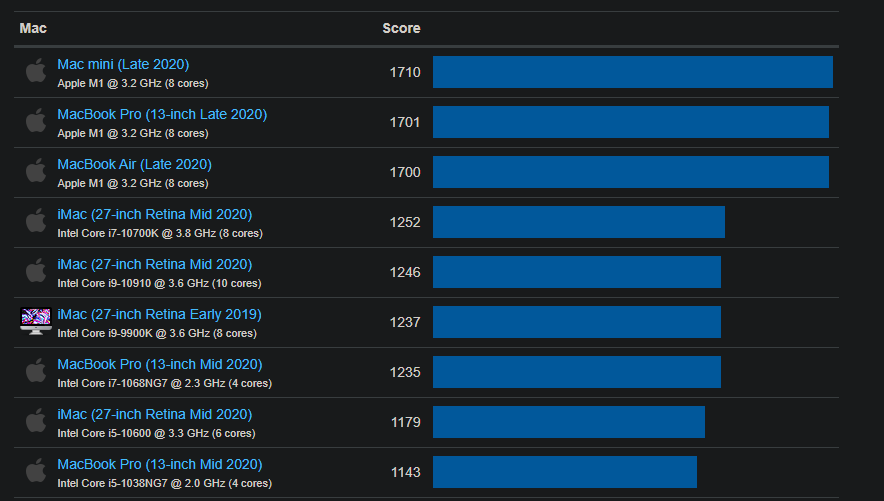Apple announced the new iPad Pro, powered by the mighty M1 chip, at its spring 2021 event. For a lot of tech fans, this was received with arms wide open.
The M1 chip is incredibly powerful and performs well, so bringing it to the iPad will definitely take that platform up a notch. Here’s why it’s an excellent upgrade.
What Is the M1 Chip?
Apple’s M1 chip is the company’s first in-house designed processing chip. The M1 is a system on a chip, which means it combines multiple components, including the CPU, GPU, RAM, Neural Engine, and the rest, into one unit.

Apple has set records with this chip, as it’s packed with a staggering 16 billion transistors. By integrating all these components onto one chip, the clever piece of tech speeds up the internal processing of devices.
This is why Apple has been able to boast such high performance from the M1.

Apple originally released this chip for the 2020 Mac lineup, moving away from the Intel chips that had powered Mac models since 2006. This change was designed to bring more processing power to Mac device, and to give Apple the flexibility to provide better performance than Intel’s offering.
How M1 Improved Macs
Apple’s M1 chip was a game changer. The impressive processing power from the chip has allowed for some massive developments in the most recent Macs—and now the iPad Pro.
For starters, the M1 chip helps to deliver much longer lasting battery life. When the first M1 Macs were announced, Apple claimed up to 20 hours of battery life. And in the real world, many users found that they got close to that. This works out to be roughly a 25-30 percent improvement on the Intel-based Macs.
Know how you can often hear the fan whirring away while you’re doing intensive tasks on your computer? Not anymore. Although the M1 MacBook Pro does have a fan, most users have mentioned that they’ve never heard it working. That’s impressive.
The performance of the M1 chip has been clearly demonstrated in both benchmarking tests and real-world tests. In benchmarking scores, Macs with the M1 chip achieved higher numbers than the most powerful Intel-based Macs that Apple offered.

During real-world tests, the M1 machines could carry out intensive tasks, such as gaming and video processing, much more quickly. Users tweeted that they were able to unzip Xcode on an M1 Mac in only five minutes, rather than the usual 10-15 minutes.
YouTubers showed that Final Cut Pro exported and processed videos in half the time it took Intel Macs.
My M1 MacBook Pro arrived today. Chances are you have various questions, but I think a whole lot is summed up in this 50-second video. (Alt text, because Twitter still doesn't make this easy: Xcode 12.3 beta unzips in 5 minutes on an M1, vs 13 minutes 22 seconds on an Intel i9) pic.twitter.com/STiivUXXnH
— Paul Hudson (@twostraws) November 17, 2020
Whether you love or hate Apple, it’s indisputable that the M1 chips greatly improved the performance of Mac computers. And that’s what’s coming to the iPad Pro.
What M1 Can Do for iPad
We’ve seen just how powerful the M1 chip is in Macs. Now imagine all that processing power in an iPad Pro.
It’s common to see comparisons between the already powerful iPad Pro and MacBook, with many people going as far as to ditch their laptops in favor of an iPad Pro. Some have wanted the iPad to get even more powerful, in order to match the MacBook. That day has come.

Taking the fast and powerful M1 chip and putting it into an iPad only further supports the idea of ditching computers in favor of the tablet. iPad models, especially the Pro line, can already do many of the same tasks as a MacBook. And now that Apple has equalized the processors of these devices, that’s even more true.
Why carry around a laptop when you can use an iPad with a much smaller footprint, touchscreen abilities, and the ability to use a stylus? It even looks like a laptop with the right accessories.
Bringing the same processing power to improve battery life has extended the previous iPad Pro’s battery life to Apple’s claim of lasting all day. This beats the 10 hours of battery from the last iPad Pro.
The eight-core CPU design of the M1 delivers up to 50 percent faster CPU performance than the A12Z Bionic chip, Apple claims. The company also says that the new M1 iPad Pro can deliver up to 40 percent faster GPU performance. This makes the new iPad Pro the fastest tablet available on the market.
Watching videos, processing video, streaming live, and getting general productivity work done is now much more efficient. The processing power of the M1 chip allows the iPad to work on these tasks with ease. We can also expect to see apps run faster, just like the M1 Macs.

Because the M1 chip shares the same basic architecture of previous A-series chips, Apple tells us that iPadOS is already optimized to take full advantage of the new M1 chip. There won’t be any hiccups or changes to software.
The Future of iPad
By including the M1 chip in the new iPad Pro, Apple has brought the same powerful processing that revolutionized Macs to its tablet line. That should get any tech enthusiast excited.
With the iPad getting the same processing abilities as a Mac, it’s likely that more and more people are going to opt for the tablet, rather than a laptop. The iPad is about to replace a lot of devices.
Image credits: Apple


